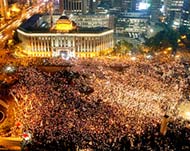China-Korea summit talks trade and security
South Korean President Roh Moo-Hyun appealed to Chinese leaders on Tuesday for a closer Northeast Asian economic community.

The premier described the “brilliant progress” in ties between Seoul and Beijing, noting that trade had increased eight-fold to $40 billion since the two countries normalised diplomatic relations in 1992.
And that figure is forecast to reach $100 billion in five years.
South Korean products such as cars, television sets and digital cameras are popular in China, while large quantities of Chinese fabric, garments, machinery and electronic products are flooding the Korean market.
In a speech to Chinese business leaders, he said Northeast Asia must catch up with other regions in deepening integration.
“Now is the time for Northeast Asia to maximise the growth potential across the region,” he said. “To this end, it is necessary to shore up the system for economic cooperation among Korea, China and Japan, the core countries in the region.”
Moo-Hyun also told Chinese executives to strengthen the South Korean currency to help maintain Korean competitiveness in the face of massive low-cost products from Chinese firms.
Security concerns
Additionally, Moo-Hyan has said that Seoul first requires dealing with North Korea’s nuclear weapons programme.
“Realising peace and prosperity in Northeast Asia above all requires peace on the Korean peninsula,” the South Korean premier told Wu Bangguo, chairman of China’s National People’s Congress.
 |
|
Last month, 20,000 South Koreans |
On Monday, Moo-Hyun met Chinese President Hu Jintao. Both vowed to work together to bring the reclusive North to the negotiating table to resolve the nuclear weapons issue.
But the agreement lacked a specified way forward, according to the Korean press, leaving some in Seoul wondering what could be done next.
“It is unclear what China’s stance is on President Moo-hyun’s request to be pro-active in preventing a further deterioration of the North Korea situation, but if China moves toward a positive direction, it will be a big help in managing the nuclear tensions,” said Seoul’s Dong-a Ilbo Daily.
Peace talks
Moo-Hyun and Hu also called for an early resumption of talks, but avoided using the expression “multilateral”, as Tokyo and Washington have sought.
However, Moo-Hyun’s national security adviser, Ra Jong-yil, said the “language used was not so important”.
“On matters of principle we have an understanding and in solving this [nuclear] problem we have an understanding among the countries whose influence is helpful,” Ra told reporters.
North Korea has yet to respond to the summit, Moo-Hyun’s third foreign tour in two months aimed at solving the nuclear debate. He visited the United States in May and went to Japan in June.